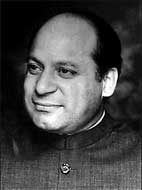

Military Comes to Power Again [Oct 12,1999]
|
|
|
General Pervez Musharraf, Chief of the Army Staff, assumed the title of Chief Executive |
On October 12,1999, Pakistan Army ousted the civilian Government headed by Prime Minister Muhammad Nawaz Sharif. After two days of chilling uncertainty, General Pervez Musharraf, Chief of the Army Staff, assumed the title of Chief Executive. Although the use of the term “Martial Law” was avoided, Pakistan once again came under Military rule. It was claimed that the army was forced to take this step to save the country from “turmoil and uncertainty”. Immediately before the takeover, Mr. Nawaz Sharif had tried to replace the Army Chief when the former was on his tour to Sri Lanka.
The Supreme Court, in a ruling on May 12, 2000, accepted that a constitutional deviation had taken place in pursuit of rather noble objectives, such as economic reforms and bringing to book the corrupt politicians, bureaucrats and businessmen. The 12 judges based their ruling on the principle of salus po puli ex supreme lex (the welfare of the people is the supreme law of any land). The court took the view that there was no other way to remove a corrupt government except through the intervention of the armed forces. The Supreme Court directed Mr. Musharaf to hold general elections by the end of 2002.
Nawaz Sharif is
sentenced to life imprisonment in the plane conspiracy
case
After the military takeover,
the former Prime Minister Nawaz Sharif, Shabaz Sharif (his brother
and former Punjab Chief Minister) and five other officials were
booked on charges of hijacking, kidnapping and attempted murder in a
“Plane Conspiracy Case”. The prosecution’s case was based on a
police report filed by an army colonel. The charges were that Nawaz
Sharif in his capacity as Prime Minster, had ordered the Civil
Aviation Authority to prevent a Colombo-Karachi PIA (Pakistan
International Airlines) commercial flight, with Musharraf on board,
from landing at Karachi or anywhere else in Pakistan. The attempted
murder charges relates to Sharif endangering the lives of Musharraf
and 200 other passengers on board by denying the plane permission to
land when it was low on fuel. The case was tried by an
anti-terrorism court in Karachi (ironically established by Nawaz
Sharif himself), which sentenced him to life imprisonment. In their
appeal to the High Court, pending a decision, Mr. Sharif’s lawyers
have maintained that no charge of corruption was proved against the
former Prime Minister, and that it was the Prime Minster’s
constitutional right to remove the Army Chief.
